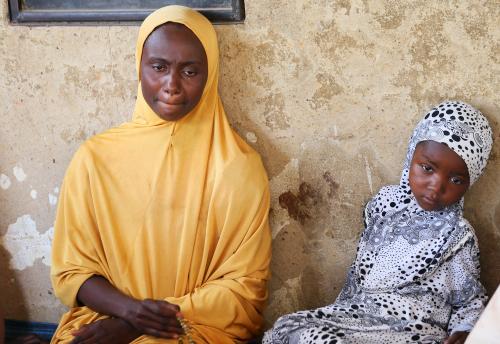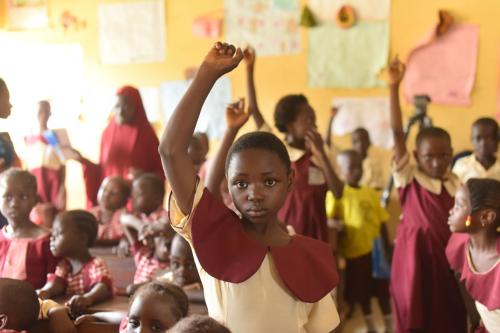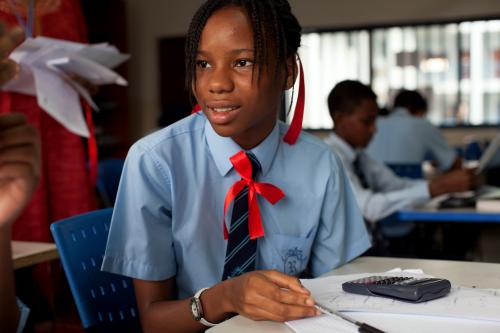On Monday, around 100 young girls were kidnapped from their classroom in northeastern Nigeria, as Boko Haram militants stormed a school the same day after killing over 70 in an attack in the country’s capital. Sadly, these kidnappings are only the latest in a long line of tragedies inflicted by the terrorist group, whose name can be loosely translated as meaning that western education is forbidden. Last year, Boko Haram burned down or destroyed 50 schools and killed around 30 teachers in Nigeria, leaving tens of thousands of children unable to attend school. Sadder still, these attacks amplify the widespread challenges that Nigeria has yet to overcome in regards to its education system.
Despite relatively strong economic growth and a plethora of human and natural resources, most notably oil, Nigeria is currently far from reaching the 2015 United Nations deadline of ensuring that all children go to school, let alone that they learn while in school. About 42 percent, or 10.5 million, of Nigerian primary-school-age children are not in school—one of the world’s largest out-of-school populations. Furthermore, enrollment rates have worsened in recent years. In 1999, only 61 percent of Nigerians that should be in primary school were, and by 2010 this had fallen to 58 percent. Huge geographical and wealth disparities also exist. Close to 60 percent of the poorest primary-age children have never been to school, compared with just 3 percent of children from the richest households. Girls, especially those in the north, are at a considerable disadvantage relative to their male counterparts—37 percent of primary-age girls in the rural northeast do not attend school, compared with 30 percent of boys. Children who do manage to get to school are struggling to learn basic literacy and numeracy skills. Around 44 percent of children nationally—and more than two-thirds in the north—who have completed sixth grade cannot read a full sentence.
Of course, it is no surprise given the recent Boko Haram attacks that children in Nigeria’s northeast have a more difficult time attending school. Yet how is it that a country with oil revenues estimated at over $50 billion in 2012 is failing so greatly in the provision of secure education for its children? Surely the activities of Boko Haram present not just an obstacle to implementing education in the country, but also reflect the product of the poor education and lack of opportunity that faced those who have now regrettably turned to such terrorism.
In another oil-rich country, amid protests against injustice and inequality, Brazil’s President Dilma Rousseff announced a law last year stipulating that 75 percent of oil royalties will go to education and health while the remaining 25 percent will be set aside for a social wealth fund. This has prompted some to ask if a law of this kind could be an answer for Nigeria’s children.
It may not be as simple as that. As the recent Boko Haram attack shows, the obstacles to achieving universal basic education in Nigeria are numerous and complex. Nigeria has one of the world’s lowest levels of social spending, though money alone will not solve the problem. Poor school infrastructure, lack of school maintenance, inadequate learning materials, and ill-qualified teachers need to be addressed. But while funding may play a part in lessening these constraints, many are strongly related to broader institutional challenges. Nigeria’s education system is over-centralized and lacks minimum standards, offering limited autonomy and accountability at the state level. Inadequate monitoring of service delivery also results in weak outcomes at the school level. These conditions led Nigeria’s minister of finance to declare in a speech at the Moghalu Foundation in July of 2012 that she would not increase the budget for education until the sector improves on strategy, execution and accountability.
Other factors compound the institutional challenges. High rates of poverty—68 percent—and significant opportunity costs to education result in Nigerian families being unable to afford to send their children to school. Barriers due to religious beliefs and cultural norms prevent many girls from attending school, in part due to early marriage and subsequent teenage pregnancies. In addition, a rapidly rising population—with 11,000 births per day—will put increasing pressure on the education sector in coming years. These statistics are inextricably tied to Nigeria’s security concerns as well, giving the unfortunate impression that many of Nigeria’s challenges are self-reinforcing and sending the country down a tragic path. Yet providing quality education may very well be the way to interrupt this cycle and kick-start movement toward positive outcomes.
Tackling these challenges will require a strong commitment from the government along with close collaboration from others. To begin with, building on Nigeria’s long-term governance reform strategy, concrete steps should be taken to improve governance and accountability of the education system and ensure transparency of the quality of schooling and learning outcomes. The establishment of school-based management committees is one way to enhance accountability and involve parents in management at the school level. In addition, school grants have been shown to provide a performance incentive for schools to improve their management and the quality of education they provide. One project in Lagos showed that additional funding led to an increase in performance on standardized testing. The expansion of such a program would be one step to improving learning in Nigerian schools.
Improvements in schools must also be paired with funds put towards ensuring children come to school ready to learn and teachers are equipped to teach. Addressing challenges like poverty and cultural norms could be done using proven mechanisms like conditional-cash transfers, especially those targeted at girls. There are some promising pilots already doing this in other parts of Nigeria. It is time to take stock of lessons learned from these projects and consider expanding helpful ones to other needy states.
Ultimately, Nigeria must do whatever it can to ensure a tragedy like the one that happened on Monday is never repeated, and that violent attacks cease to exclude children from accessing their right to education. The current status of most of the girls abducted on Monday is still unknown, with reports that only 14 have returned home. As girls in one of Nigeria’s most impoverished regions sought to educate themselves and work toward better lives, they were robbed of this chance by a group reflective of poverty and low education. Nigeria’s government can and must take steps to prevent this from happening again, to prioritize education as a way out of such crises, and to consider using its bountiful oil resources in a meaningful and effective way.









Commentary
Abducted Schoolgirls in Nigeria: Improving Education and Preventing Future Boko Haram Attacks
April 17, 2014